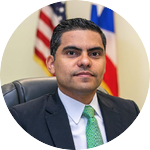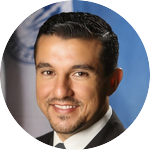ICMA honors National Hispanic Heritage Month by highlighting ethics resources developed by its partners in Latin America. ICMA and the Local Government Hispanic Network (LGHN) participated in the ninth annual Experiencia Puerto Rico conference, bringing together more than 400 municipal leaders from across the Caribbean and Latin America. The focus of this year’s conference was “Ethics, Compliance, and Transparency,” a wonderful theme for ICMA as we celebrate 100 years of global engagement and the ICMA Code of Ethics.
For an expanded version of this article in Spanish, click here. // Para obtener una edición ampliada del artículo en español, haga clic aquí.
Panelists from the session, “Development of an Ethical Culture in Local Governments,” discussed the importance of fostering an ethical culture in public service, how to overcome challenges, and how to measure its impact. We’ve asked the panelists to share some takeaways from the session:

Luis A. Pérez Vargas, JD
Executive Director, Puerto Rico Office of Government Ethics
“Our joint presentation emphasized strengthening ethics in public service as essential for improving citizens’ quality of life and ensuring effective governance. Corruption is one of the most complex and persistent problems facing Puerto Rico, as well as governance systems worldwide. Its impact goes beyond direct economic losses, affecting social development, weakening democratic institutions, and eroding public trust in governments.
Given its high complexity as a social phenomenon, it is crucial to promote multisectoral and international partnerships that facilitate the analysis of its variables, allowing for the identification of its scope and impact on critical areas for society. These partnerships also help identify initiatives implemented by other entities to address the major challenges that corruption poses to a country’s governance. ICMA provides a vital space to discuss these challenges and promote innovative and collaborative solutions.
The Puerto Rico Office of Government Ethics (OGE) has developed educational and legal advisory initiatives to promote ethics in public service, such as online courses, advertising campaigns, and personalized guidance. Through the Center for the Development of Ethical Thought, our office implements various educational methods that address the different generational profiles and functions of public servants. Empirical studies like the ‘Corruption Radiography’ allow the OGE to analyze adjudicated cases of ethical violations and collect data on the public servants involved. This analysis facilitates the evaluation of the state of ethics in government entities and the adjustment of preventive strategies. Another initiative developed by the OGE includes advertising campaigns designed to address relevant topics regarding compliance with the Puerto Rico Office of Government Ethics Act, Public Law 1-2012, and the promotion of ethical behavior in public service. Access more Puerto Rico OGE resources at eticapr.com.”

Salvador Torres
Director, ICMA Mexico-Latin America
“ICMA has been present in Mexico since 1992, and ICMA Mexico-Latin America (ICMA-ML) was founded in 2004. Mexico faces huge challenges in its public sector with the topics of corruption and ethics. International indexes like the Corruption Perceptions Index (CPC) and Freedom in the World Report give the country a low ranking. Between 2015 and 2016, Mexico’s federal congress approved a constitutional reform and multiple laws to foster ethics and integrity in the Mexican public sector. It was the first official effort in the matter and a new landscape. To implement the laws, various models and tools, as well as multiple initiatives were developed by the federal, state, and municipal governments, as well as by civil, private, and academic organizations.
ICMA-ML’s contribution to these initiatives was the development of the Public Ethics Consolidation Program (PEC or CEP in Spanish) in 2016, and it was grounded in ICMA’s long and broad experience of promoting ethical conduct. Prior to the development of CEP, ICMA-ML had captured feedback from over two decades of field work and technical assistance with Mexican public servants to develop this program.
Through the CEP Program, public officials and institutions learn about the skills, tools, and infrastructure necessary to make ethical decisions and conduct themselves in a manner that is not only in accordance with ethical principles and legal standards, but also how to identify and address risks, ultimately resulting in gaining citizens’ trust and confidence. Notably, the CEP Program also has a “citizen component” based on the Citizen Index of Institutional Strength for Public Ethics (ICIFIEP). This index seeks to measure, from a citizens’ perspective, the level of institutional strength for public ethics existing in subnational public entities based on the Mexican General Law of Administrative Responsibilities requirements.
The implementation of the CEP Program since 2016 has provided some valuable lessons. At the start, the program was focused mainly on training public servants on ethics-related topics. Even though public servants may be trained in ethical behaviors and decision-making, once they are back at their daily routines facing a multitude of internal and external challenges and/or pressures, ethical behavior can easily diminish. For this reason, ICMA-ML has concluded that a solid institutional framework that prioritizes ethics as critical to good stewardship of public resources is imperative. Simply, the use of an institutional tool to identify risks, address them, and measure outcomes, coupled with training and the strong implementation of a code of ethics or conduct, is more effective.
Better tools available to citizens to hold public institutions accountable and provide feedback are needed. Over time, ICMA-ML also learned that the ICIFIEP Index is a complex tool that requires a lot of time to implement. For this reason, ICMA-ML is already working on developing “ICIFIEP 2.0” in order to make it more useful to civil organizations and their constituents.
Active participation by public entities and its citizens are critical components to fostering a meaningful and effective culture of ethics, and ICMA-ML is trying to do its part to promote these efforts in Mexico. For more information on CEP and ICMA- ML’s work, visit icmaml.org or email storres@icmaml.org.”

Jessica Cowles
Ethics Director, ICMA
“Our panel presentation at Experiencia Puerto Rico had several key takeaways on how to promote, measure, and institutionalize an ethical culture within the organization:
• Ethics in public service means we uphold respect for the democratic process and laws, as well as roles and contributions of elected and appointed officials.
• As public servants in this noble profession, we have an obligation to be good stewards of community resources. Corruption undermines public trust in local government at its very core.
• A failure to remain neutral in partisan politics weakens public confidence that local governments work for the greater good of every community member.
• An ethical culture starts at the top of the organization and needs to be a priority at the highest level.
• Model the behavior you want to see to set the right example and understand how your professional and personal conduct sets the tone for the entire organization.
• We promote personal integrity, honesty, accountability, openness, impartiality, evidence-based decisions, and transparency; they should be integrated into all departments and operations.
• Have a formal ethics complaint process, procedure, or policy, then follow it!
ICMA’s role is to be a convener of local government professionals and facilitate discussions about what local governments are facing worldwide with a responsibility to share the best practices, initiatives, and resources that its global partners and affiliates develop. You can also visit icma.org/ethics to access ICMA ethics resources and training opportunities.”
For an expanded version of this article in Spanish, click here. // Para obtener una edición ampliada del artículo en español, haga clic aquí.
New, Reduced Membership Dues
A new, reduced dues rate is available for CAOs/ACAOs, along with additional discounts for those in smaller communities, has been implemented. Learn more and be sure to join or renew today!
